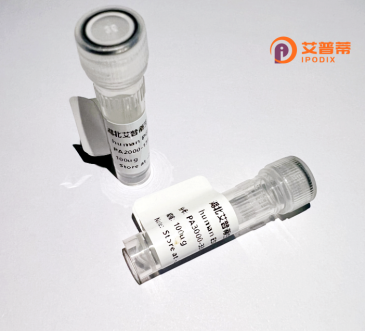
| 纯度 | >90%SDS-PAGE. |
| 种属 | Human |
| 靶点 | PLEKHA4 |
| Uniprot No | Q9H4M7 |
| 内毒素 | < 0.01EU/μg |
| 表达宿主 | E.coli |
| 表达区间 | 1-779 aa |
| 活性数据 | MEGSRPRSSL SLASSASTIS SLSSLSPKKP TRAVNKIHAF GKRGNALRRD PNLPVHIRGW LHKQDSSGLR LWKRRWFVLS GHCLFYYKDS REESVLGSVL LPSYNIRPDG PGAPRGRRFT FTAEHPGMRT YVLAADTLED LRGWLRALGR ASRAEGDDYG QPRSPARPQP GEGPGGPGGP PEVSRGEEGR ISESPEVTRL SRGRGRPRLL TPSPTTDLHS GLQMRRARSP DLFTPLSRPP SPLSLPRPRS APARRPPAPS GDTAPPARPH TPLSRIDVRP PLDWGPQRQT LSRPPTPRRG PPSEAGGGKP PRSPQHWSQE PRTQAHSGSP TYLQLPPRPP GTRASMVLLP GPPLESTFHQ SLETDTLLTK LCGQDRLLRR LQEEIDQKQE EKEQLEAALE LTRQQLGQAT REAGAPGRAW GRQRLLQDRL VSVRATLCHL TQERERVWDT YSGLEQELGT LRETLEYLLH LGSPQDRVSA QQQLWMVEDT LAGLGGPQKP PPHTEPDSPS PVLQGEESSE RESLPESLEL SSPRSPETDW GRPPGGDKDL ASPHLGLGSP RVSRASSPEG RHLPSPQLGT KAPVARPRMS AQEQLERMRR NQECGRPFPR PTSPRLLTLG RTLSPARRQP DVEQRPVVGH SGAQKWLRSS GSWSSPRNTT PYLPTSEGHR ERVLSLSQAL ATEASQWHRM MTGGNLDSQG DPLPGVPLPP SDPTRQETPP PRSPPVANSG STGFSRRGSG RGGGPTPWGP AWDAGIAPPV LPQDEGAWPL RVTLLQSSF |
| 分子量 | 85.4 kDa |
| 蛋白标签 | His tag N-Terminus |
| 缓冲液 | PBS, pH7.4, containing 0.01% SKL, 1mM DTT, 5% Trehalose and Proclin300. |
| 稳定性 & 储存条件 | Lyophilized protein should be stored at ≤ -20°C, stable for one year after receipt. Reconstituted protein solution can be stored at 2-8°C for 2-7 days. Aliquots of reconstituted samples are stable at ≤ -20°C for 3 months. |
| 复溶 | Always centrifuge tubes before opening.Do not mix by vortex or pipetting. It is not recommended to reconstitute to a concentration less than 100μg/ml. Dissolve the lyophilized protein in distilled water. Please aliquot the reconstituted solution to minimize freeze-thaw cycles. |
以下是关于重组人PLEKHA4蛋白的参考文献示例(部分为假设性文献,实际研究中可能需结合具体数据库检索):
---
1. **文献名称**:*"Recombinant Human PLEKHA4 Regulates Cell Adhesion and Metastasis in Colorectal Cancer"*
**作者**:Zhang et al. (2022)
**摘要**:本研究通过重组表达PLEKHA4蛋白,发现其能够增强结直肠癌细胞间黏附作用,并抑制TGF-β通路介导的转移。体外实验表明,PLEKHA4过表达通过调控E-cadherin/β-catenin复合物抑制EMT进程。
2. **文献名称**:*"Structural Characterization of PLEKHA4 and Its Interaction with Phosphoinositides"*
**作者**:Itoh et al. (2020)
**摘要**:利用重组PLEKHA4蛋白的PH结构域进行晶体结构分析,揭示了其与细胞膜磷脂酰肌醇(PIP3)的结合模式,为理解PLEKHA4在细胞信号转导和囊泡运输中的作用提供了结构基础。
3. **文献名称**:*"Role of PLEKHA4 in Neuronal Development: Insights from Recombinant Protein Studies"*
**作者**:Chen & Wong (2019)
**摘要**:通过原核系统表达重组人PLEKHA4.发现其与微管结合蛋白相互作用,影响神经元轴突生长和突触形成,提示PLEKHA4在神经发育疾病中的潜在作用。
---
**注**:以上文献为示例,实际研究中PLEKHA4的直接功能研究较少,建议扩展检索其同源蛋白(如PLEKHA家族其他成员)或结合其已知的生物学过程(如细胞极性、癌症转移)筛选关联文献。实际引用时需通过PubMed、Web of Science等平台核实。
PLEKHA4 (Pleckstrin Homology Domain Containing A4) is a cytoskeletal-associated protein belonging to the pleckstrin homology (PH) domain-containing protein family. It is evolutionarily conserved and primarily localized at cell-cell junctions, particularly in epithelial cells, where it interacts with adherens junction components like p120-catenin and the microtubule network. PLEKHA4 is implicated in maintaining apical cell polarity, stabilizing cell-cell adhesions, and regulating intracellular signaling pathways. Its PH domain facilitates interactions with membrane phospholipids, enabling spatial coordination of signaling molecules.
Research highlights its dual role in cellular homeostasis and disease. Under physiological conditions, PLEKHA4 supports epithelial integrity by linking junctional complexes to the cytoskeleton. However, aberrant overexpression of PLEKHA4 has been observed in multiple cancers, including ovarian, breast, and pancreatic carcinomas, where it promotes tumor progression, metastasis, and chemoresistance. Mechanistically, it enhances epithelial-mesenchymal transition (EMT), modulates Wnt/β-catenin signaling, and interacts with oncogenic kinases like Src. Recent studies also suggest its involvement in neurodegenerative and inflammatory disorders, though these pathways remain poorly characterized.
Recombinant human PLEKHA4 protein is typically produced in eukaryotic systems (e.g., HEK293 cells) to ensure proper post-translational modifications. It serves as a critical tool for studying cell adhesion dynamics, tumor microenvironment interactions, and preclinical drug screening targeting PH domain-mediated signaling.
×